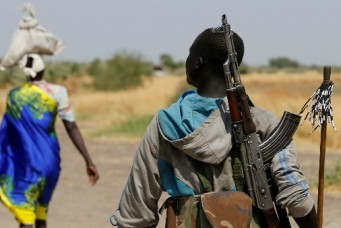Opportunity to End Al-Bashir Rule in Sudan?
A promising African country is decimated by wars, violence, and lack of individual liberties. President Omar Al-Bashir, who elected himself multiple times through fraudulent and farcical elections, has ruled the country with an iron fist and explosive violence for more than two decades. But the county is revolting, from its peripheries.
A promising African country is decimated by wars, violence, and lack of individual liberties. President Omar Al-Bashir, who elected himself multiple times through fraudulent and farcical elections, has ruled the country with an iron fist and explosive violence for more than two decades. But the county is revolting, from its peripheries, against the concentration of power and wealth by the oligarchs of the National Congress Party.
The waves of the Arab revolutions are being felt by Khartoum. Inspired by the protests in Tunisia and then Egypt, young Sudanese launched demonstrations in the capital as well as in El Fasher, the hub of the Darfur province. Police responded by arresting opposition leaders and in Darfur by opening fire at El Fasher University, killing at least two students.
If the brutal regime clampdown has prevented mass protests from materializing, at least to date, the youth are nonetheless preparing for them. The Sudanese Youth Forum’s radio station plays patriotic songs and calls on Sudanese to emulate the youth elsewhere in the Arab world. Facebook groups with names like Shrara (Lighting the Flame) and Giriffina (Disgusted) and springing up. Opposition figures have called for a major demonstration on April 20.
Despite its use of force, the regime in Khartoum cannot control the revolt from the periphery. Sudan will be a different country by July, because the south voted for secession in January and will become an independent nation. The south is gone, not only with its oil but with its people and the beauty of diversity. The heart and the soul of the country are gone with it. The severing of the south may provide another cause for new protests in the north. Darfur, meanwhile, has been left in ruins, with millions of internally displaced persons who are yearning for freedom and justice. Yet, in spite of all Darfur that has suffered at the hands of the Al-Bashir regime, its youth are preparing to join hands with their counterparts in the rest of Sudan for a new dawn.
Meanwhile, the ruling elites of the NCP live opulent lifestyles and indulge in conspicuous wealth while poverty and inequality are festering in every corner of the country. The government kleptocracy has squandered the oil money, either through military spending or massed into foreign bank accounts as alleged in a U.S. diplomatic cable released by Wikileaks and published by the Guardian newspaper. The military and the security apparatus consume about 78 percent of the budget, while education and health together consume about 6 percent. When the government could not borrow for four consecutive months from foreign creditors, it adopted austerity measures and made deep cuts in education and health while the spending on military and the security apparatus escaped change.
The minister of finance did not tell the truth when he introduced those measures at 2 a.m. one night to be approved by the rubber-stamp parliament. The international community, including China and the Arab countries, refused to lend to Sudan because it is not creditworthy. That is why the government ran so low on foreign reserves. Making matters worse is the exodus of investors. The underlying reasons that Sudan’s budget is in the red are the International Criminal Court charges of crimes against humanity, war crimes and genocide lodged against Al-Bashir, and the continuing conflict in Darfur.
Sad to say, a promising country is left hanging on the defunct ideology of Al-Bashir and his old guard. The country has become the “object” instead of the “subject”; in other words, the country becomes an agenda item for every country, instead of being part of the community of nations to solve problems. Police state rule did not teach them that power has its own limits. You cannot use the same hammer from the tool box all the time. The demands of the Darfuri have never stopped, even after 300,000 deaths. The northern opposition’s demands for freedom, liberty, and pluralism have never dissipated. When the Al-Bashir oligarchy finally learns, it might be in a courtroom in The Hague.
Hamid Eltgani Ali is an assistant professor in the Public Policy and Administration Department, School of Global Affairs and Public Policy, American University in Cairo.



